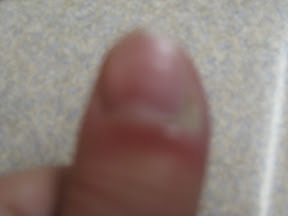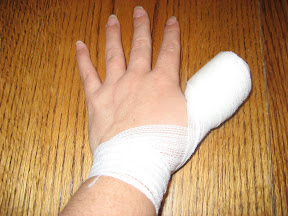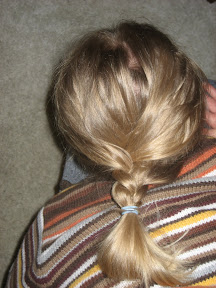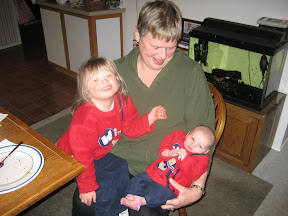When I was pregnant with Ellie and looking for a pediatrician, I met Dr. Jan. She was recommended by a co-worker who has a son with Trisomy 21 and a repaired AV Canal defect (like Ellie). Dr. Jan has four children, one of whom also has Down syndrome.
Dr. Jan met with Paul and me for a normal pediatrician interview except that she sat with us for nearly an hour, and said some things that really stuck with me and made me feel so so very much better.
For example, she told me how well-meaning people often tell her about people they meet with Down syndrome, like perhaps the man sweeping the floor at McDonald's, with the idea that they're encouraging her to believe that her daughter too might be a productively employed member of society when she grows up. Dr. Jan let us know that it's OK to feel angry about these comments and about the whole situation, because perhaps I didn't dream of my daughter sweeping floors at McDonald's. She said, "Maybe I dreamed that my daughter might like to be a doctor like me." Yes.
She also said something that I loved but couldn't yet identify with. She said that when her daughter was 2 weeks old, she realized that if she had the ability to "fix" her, to "cure" her, she wouldn't do it. The Down syndrome is just a part of who she is. I waited anxiously to feel that way about Ellie, but I never have.
I love Ellie. I love Ellie as much as any parent loves her child, which is to say that I love her more than I would have thought possible. Isn't that what every new parent says? Well, it's true.
But if there were a safe cure . . .
Wouldn't it be nice for Ellie, to live in a world where her features are no longer associated with a negative cognitive association? Wouldn't it be nice for Ellie not to have to fight so hard to fit in at school and life as she gets older? Wouldn't it be nice . . .
Wouldn't it be nice for me? It would, it would.
Just after Ellie was born, someone sent me a newspaper article about some promising research for a cure for the cognitive effects associated with Trisomy 21. It was expected in 9-10 years, comfortably within Ellie's childhood. I still have the article on my refrigerator.
And in the latest Scientific American, there's more news. I had to wait a couple of days to be ready to read past the headline. When I finally read the article, I was so excited and anxious that I felt like throwing up, or at least jumping up and down.
I won't expose Ellie to a clinical trial. Or a significant risk of seizures or any other dangerous side effects. I love her too much - just as she is. And she is doing so very well.
But if, if, if - if they find a drug that counteracts the cognitive effects of Trisomy 21, Down syndrome, well . . .
I believe that Ellie will still be Ellie, just as sweet and precious, just as perfect to me, even with a drug that makes it easier for her to learn and remember things.
Some day, God willing, she will be able to choose for herself. But until then, I believe that I would chose such a safe treatment for her, if it became available. She would still have disabilities; nothing will change that. But our lives would - perhaps - become a bit easier.
New Release Spotlight: Rachel Held Evans
-
We are so proud to honor the enduring legacy of Rachel Held Evans with
this new book shepherded into existence by the incomparable Sarah Bessey.
BRAVIN...
4 days ago








